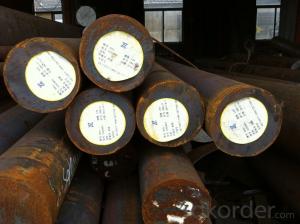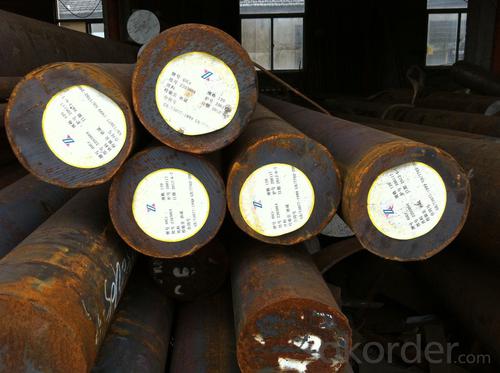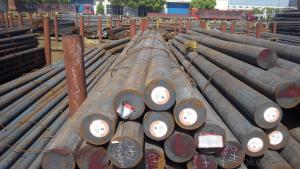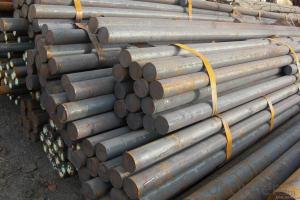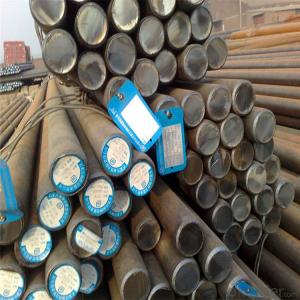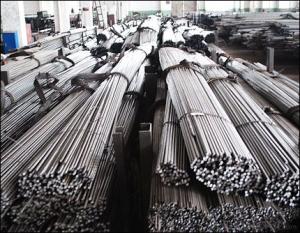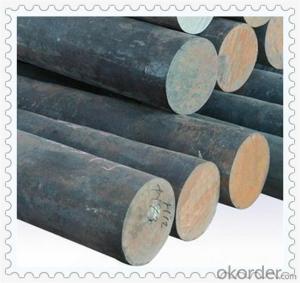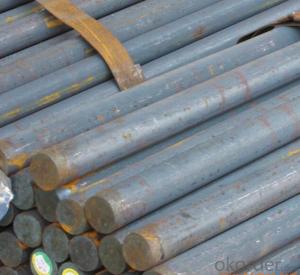Low Carbon Steel SAE1045 S45CCR S55C
- Loading Port:
- China main port
- Payment Terms:
- TT OR LC
- Min Order Qty:
- 30 m.t.
- Supply Capability:
- 10000 m.t./month
OKorder Service Pledge
OKorder Financial Service
You Might Also Like
Specification
Low Carbon Steel SAE1045 S45CCR S55C
Product Information:
Heat treatment of c45 carbon steel
1.Quench:1000-1040`C via 600`C and 850`C, preheating oil or wind cooling
2.Temper temperature should be higher than working temperature in order to stabilize the working size of mold
3.Heat up to 650°C of average temperature in order to eliminate the machined stress, 500 °c air cooling after electric cooker cooling
4.Tempering, 800-850 °c ,slow cooling after diathermia
5. Melting Process of SKD61 steel rod
EAF: Electric Furnace+LF+VD(Optional)
Application of c45 carbon steel
(1)Can be used in many fields such as building, automobile, shipbuilding, petrochemical, machinery, medicine,
food, electric power, energy, space, building and decoration, etc.
(2) Can be made into mould template, mortise pin, column
(3)This kind of steel have good mechanical property, is widely used in structural parts which may support
stress alternation, especially made into some connecting rods, bolts, wheel gear...
(4) This kind of steel is the most common blanks and materials of shaft part
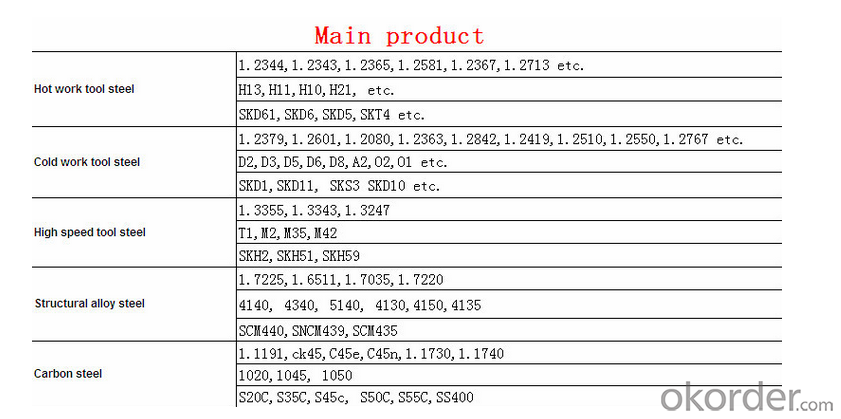 Product Overviews:
Product Overviews:
| Product Name | Typical Grades | Diameter(mm) | Standard adopted |
| Carbon Steel | 20 (1020/S20C/C22) | Ø16-Ø300 | GB/SAE/JIS/DIN |
| 40 (1040/S40C/C40) | |||
| 45 (1045/S45C/C45) | |||
| Bearing Steel | GCr9 (51100/SUJ1) | Ø12-Ø250 | |
| GCr15 (52100/SUJ2/100Gr6) | |||
| GCr9SiMn (A485-Gr.1/SUJ3) | |||
| Cr-Mo Steel | 20Cr (5120/SCr420H/20Cr4) | Ø12-Ø250 | |
| 40Cr (5140/SCr440/41Cr4) | |||
| 42CrMo(4140/SCM440/42CrMo4) | |||
| Gear Steel | 20CrNiMo | Ø16-Ø600 | |
| 20CrMn(5115/SMnC420/20MnCr5) | |||
| 20CrNiMo(8620/SNCM220/20CrMiMo2) |
Product Show:

Our Advantages:
· Industry experience over 20 years.
· Shipment of goods -More than 70 countries worldwide.
· The most convenient transport and prompt delivery.
· Competitive price with best service.
· High technical production line with top quality products.
· High reputation based on best quality products.
With our experienced, enthusiastic and dynamic staffs, we assure to bring you the products with best quality, reasonable prices and good after-sales services under the motto: Friends First, Business After.
Communication, Experience, Expertise and Best efforts are our Promises to you.
- Q: How is precipitation-hardening steel used in aerospace applications?
- Precipitation-hardening steel is used in aerospace applications due to its excellent strength-to-weight ratio, corrosion resistance, and high temperature endurance. It is commonly used to manufacture various components like aircraft landing gear, engine parts, and structural elements. The steel's ability to be heat treated and aged to enhance its mechanical properties makes it ideal for aerospace applications, where strength, durability, and lightweight materials are crucial for safe and efficient flight operations.
- Q: What are the different heat treatment processes for special steel?
- There are several different heat treatment processes for special steel, including annealing, quenching, tempering, case hardening, and precipitation hardening.
- Q: What are the different applications of special steel in the construction industry?
- Special steels are highly versatile materials that find numerous applications in the construction industry. One of the primary uses of special steel in construction is in the production of structural components. Special steels, such as high-strength low-alloy (HSLA) steel and weathering steel, are commonly employed to construct buildings, bridges, and other infrastructure projects that require superior strength and durability. In addition to structural applications, special steel is also extensively utilized in the construction of pipelines. This is particularly true for oil and gas pipelines, where special steels with excellent resistance to corrosion and high-pressure conditions are crucial. Stainless steel, for instance, is commonly employed due to its exceptional corrosion resistance properties, making it ideal for harsh environments. Another vital application of special steel in construction is in the production of reinforcing bars, commonly known as rebars. Reinforcing steel bars are used to reinforce concrete structures, such as buildings, bridges, and highways, by providing additional strength to withstand tension forces. Special steel rebars, such as micro-alloyed steel or carbon steel, are specifically designed to enhance the structural integrity and durability of concrete structures. Furthermore, special steel is extensively used in the construction of high-rise buildings and skyscrapers. The exceptional strength, ductility, and fire resistance properties of special steels, such as carbon steel or alloy steel, make them ideal for constructing tall structures that can withstand heavy loads and resist the impact of fire incidents. Special steel also finds application in the construction of equipment and machinery used in the construction industry. For instance, high-speed steel (HSS) is commonly used to manufacture cutting tools, drill bits, and saw blades that are essential for various construction activities. HSS possesses exceptional hardness, wear resistance, and high-temperature strength, making it suitable for heavy-duty cutting and drilling applications. In conclusion, special steel plays a crucial role in the construction industry due to its superior strength, durability, corrosion resistance, and fire resistance properties. It finds applications in structural components, pipelines, reinforcing bars, high-rise buildings, and construction machinery. Special steel ensures the safety, longevity, and reliability of construction projects, making it an essential material in the industry.
- Q: What are the properties of cobalt-based alloys?
- Cobalt-based alloys typically exhibit excellent corrosion resistance, high strength, and good wear resistance. They also have high temperature stability, making them suitable for use in high-temperature applications. Additionally, these alloys have magnetic properties, allowing them to be used in electromagnetic applications.
- Q: What is the role of special steel in the manufacturing of precision instruments?
- Special steel plays a crucial role in the manufacturing of precision instruments. Precision instruments, such as watches, surgical instruments, measuring tools, and aerospace components, require materials that possess exceptional qualities like durability, strength, corrosion resistance, and dimensional stability. Special steel, with its unique composition and properties, is specifically engineered to meet these demanding requirements. One of the key advantages of special steel is its high level of purity and uniformity. It undergoes extensive refining and purification processes to remove impurities, ensuring consistent and reliable performance. This purity is essential in precision instruments as it minimizes the risk of contamination, which could lead to inaccuracies or failures in their functioning. Another vital characteristic of special steel is its exceptional strength and hardness. Precision instruments often need to withstand high levels of stress, pressure, or mechanical forces without deforming or failing. Special steel, with its superior strength, provides the necessary structural integrity and stability to these instruments, allowing them to maintain their accuracy and reliability over time. Moreover, special steel exhibits excellent corrosion resistance, which is crucial for precision instruments that may come into contact with moisture, chemicals, or other corrosive substances. Corrosion can deteriorate the surface finish and compromise the functionality of the instruments. Special steel's resistance to corrosion ensures that the instruments can withstand harsh environments and continue to perform accurately. In addition to its physical properties, special steel is highly machinable and can be shaped into complex and intricate components with tight tolerances. Precision instruments often require intricate designs and intricate parts that demand high precision in their manufacturing process. Special steel's machinability allows for the production of these complex components with utmost precision, ensuring the overall accuracy and functionality of the instruments. In summary, the role of special steel in the manufacturing of precision instruments is vital. Its purity, strength, corrosion resistance, and machinability make it an ideal material for producing high-quality instruments that can deliver precise measurements, withstand demanding conditions, and maintain their accuracy over time. Without special steel, the production of precision instruments with such exceptional qualities would be significantly compromised.
- Q: How is special steel used in the chemical industry?
- Special steel is used in the chemical industry primarily for its corrosion resistance, high temperature stability, and durability. It is widely utilized in the construction of chemical processing equipment, such as reactors, tanks, and pipelines, to withstand harsh and corrosive environments. Additionally, special steel alloys are employed in the production of catalysts, which are essential for various chemical reactions. Overall, special steel plays a crucial role in ensuring the safety, efficiency, and longevity of chemical processes within the industry.
- Q: What are the different joining processes for special steel?
- There are various joining processes for special steel, including welding, brazing, and soldering. Welding involves melting the steel and fusing it together, while brazing uses a filler metal with a lower melting point to join the steel parts. Soldering, on the other hand, uses a lower melting point alloy to create a bond between the steel pieces. Each process has its own advantages and limitations, and the choice depends on factors such as the type of steel, the desired strength of the joint, and the application requirements.
- Q: Can special steel be used in the textile industry?
- Yes, special steel can be used in the textile industry. Special steel, such as stainless steel, can be utilized in various textile machinery components like needles, pins, and cutting tools due to its durability, corrosion resistance, and high strength. Additionally, special steel wire can be used in weaving, knitting, and braiding processes to enhance the strength and performance of textile products.
- Q: What are the different methods of surface electropolishing for special steel?
- There are several methods of surface electropolishing for special steel, including the use of acid-based or alkaline-based electrolytes, pulse current electropolishing, and reverse current electropolishing. The choice of method depends on factors such as the type of special steel being treated and the desired surface finish.
- Q: How is special steel stored and transported?
- Special steel is typically stored and transported in a controlled environment to ensure its quality and prevent any damage or contamination. It is stored in covered warehouses or facilities equipped with proper ventilation, humidity control, and temperature regulation. Additionally, special steel is often stored on racks or shelves to prevent direct contact with the ground and minimize the risk of corrosion. When it comes to transportation, special steel is usually transported in specially designed containers or crates, ensuring protection from external elements and providing secure handling during transit.
Send your message to us
Low Carbon Steel SAE1045 S45CCR S55C
- Loading Port:
- China main port
- Payment Terms:
- TT OR LC
- Min Order Qty:
- 30 m.t.
- Supply Capability:
- 10000 m.t./month
OKorder Service Pledge
OKorder Financial Service
Similar products
Hot products
Hot Searches
Related keywords
